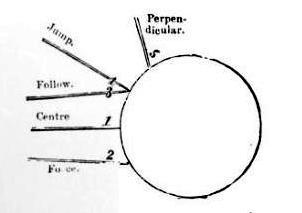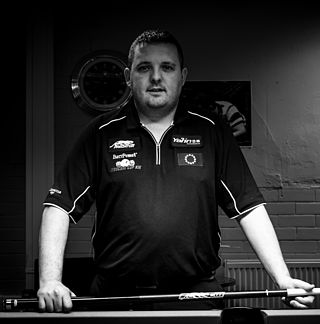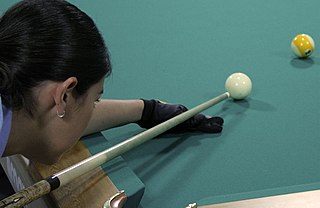See also
- Cue ball, the ball struck with the cue stick in billiards, pool, snooker, and other cue sports
- Cueball Carmichael, American professional wrestler, trainer and promoter
Q-ball is a hypothetical form of matter (namely, a non-topological soliton) in theoretical physics.
Q-ball or Q Ball may refer to:

Cue sports are a wide variety of games of skill played with a cue, which is used to strike billiard balls and thereby cause them to move around a cloth-covered table bounded by elastic bumpers known as cushions.
English usually refers to:

Eight-ball is a discipline of pool played on a billiard table with six pockets, cue sticks, and sixteen billiard balls. The object balls include seven solid-colored balls numbered 1 through 7, seven striped balls numbered 9 through 15, and the black 8 ball. After the balls are scattered with a break shot, a player is assigned either the group of solid or striped balls once they have legally pocketed a ball from that group. The object of the game is to legally pocket the 8-ball in a "called" pocket, which can only be done after all of the balls from a player's assigned group have been cleared from the table.

Nine-ball is a discipline of the cue sport pool. The game's origins are traceable to the 1920s in the United States. It is played on a rectangular billiard table with pockets at each of the four corners and in the middle of each long side. Using a cue stick, players must strike the white cue ball to pocket nine colored billiard balls, hitting them in ascending numerical order. An individual game is won by the player pocketing the 9-ball. Matches are usually played as a race to a set number of racks, with the player who reaches the set number winning the match.

English billiards, called simply billiards in the United Kingdom and in many former British colonies, is a cue sport that combines the aspects of carom billiards and pool. Two cue balls and a red object ball are used. Each player or team uses a different cue ball. It is played on a billiards table with the same dimensions as one used for snooker and points are scored for cannons and pocketing the balls.
Cue or CUE may refer to:

A billiard ball is a small, hard ball used in cue sports, such as carom billiards, pool, and snooker. The number, type, diameter, color, and pattern of the balls differ depending upon the specific game being played. Various particular ball properties such as hardness, friction coefficient, and resilience are important to accuracy.

The midbrain is anatomically delineated into the tectum (roof) and the tegmentum (floor). The midbrain tegmentum extends from the substantia nigra to the cerebral aqueduct in a horizontal section of the midbrain. It forms the floor of the midbrain that surrounds below the cerebral aqueduct as well as the floor of the fourth ventricle while the midbrain tectum forms the roof of the fourth ventricle. The tegmentum contains a collection of tracts and nuclei with movement-related, species-specific, and pain-perception functions. The general structures of midbrain tegmentum include red nucleus and the periaqueductal grey matter.

Russian pyramid, also known as Russian billiards, is a form of billiards played on a large billiard table with narrow pockets. It is popular across Eastern Europe as well as countries of the former Soviet Union/Eastern Bloc. In Western countries, the game is known as pyramid billiards, or simply pyramid within professional circles.

Pool is a classification of cue sports played on a table with six pockets along the rails, into which balls are shot. Each specific pool game has its own name; some of the better-known include eight-ball, blackball, nine-ball, ten-ball, seven-ball, straight pool, one-pocket, and bank pool. Eight-ball is the most frequently played discipline of pool, and is often thought of as synonymous with "pool".
Eight-ball is a pool game played with a solids-and-stripes ball set.

Four-ball billiards or four-ball carom is a carom billiards game, played on a pocketless table with four billiard balls, usually two red and two white, one of the latter with a spot to distinguish it. Each player is assigned one of the white balls as a cue ball. A point is scored when a shooter's cue ball caroms on any two other balls in the same shot. Two points are scored when the shooter caroms on each of the three object balls in a single shot. A carom on only one ball results in no points, and ends the shooter's inning.
The following is a glossary of traditional English-language terms used in the three overarching cue sports disciplines: carom billiards referring to the various carom games played on a billiard table without pockets; pool, which denotes a host of games played on a table with six pockets; and snooker, played on a large pocket table, and which has a sport culture unto itself distinct from pool. There are also games such as English billiards that include aspects of multiple disciplines.

Cue sports techniques are a vital important aspect of game play in the various cue sports such as carom billiards, pool, snooker and other games. Such techniques are used on each shot in an attempt to achieve an immediate aim such as scoring or playing a safety, while at the same time exercising control over the positioning of the cue ball and often the object balls for the next shot or inning.

Five-pin billiards or simply five-pins or 5-pins, is today usually a carom billiards form of cue sport, though sometimes still played on a pocket table. In addition to the customary three balls of most carom games, it makes use of a set of five upright pins (skittles) arranged in a "+" pattern at the center of the table. The game is popular especially in Italy and Argentina, but also in some other parts of Latin America and Europe, with international, televised professional tournaments. It is sometimes referred to as Italian five-pins or Italian billiards, or as italiana. A variant of the game, goriziana or nine-pins, adds additional skittles to the formation. A related pocket game, with larger pins, is played in Scandinavia and is referred to in English as Danish pin billiards, with a Swedish variant that has some rules more similar to the Italian game.

A trick shot is a shot played on a billiards table, which seems unlikely or impossible or requires significant skill. Trick shots frequently involve the balls organized in ways that are unlikely or impossible to appear in normal play, such as balls being in a straight line, or use props such as extra cues or a triangle that would not be allowed on the table during a game. As an organized cue sports discipline, trick shot competition is known as artistic pool.

Sinuca brasileira, often simply called sinuca, is a cue sport played on a snooker table, using only one red ball instead of snooker's fifteen, with the normal six colours of the standard set of snooker balls. Each ball carries the same basic point value as in snooker. As with other pocket billiards games, a white cue ball is used to pot the red and other coloured balls. The game is played almost exclusively in Brazil and is little known outside this region.

Christopher Melling is an English professional pool and snooker player and former world number 1 at World Rules British Eight-Ball. He won the WEPF World Eightball Championship twice, in 2001 and 2003. He was ranked #1 in 2003 by the World Eightball Pool Federation. Melling has also twice won the International Pool Masters and the European Professional title (2002). He was the first player to win two International Tour events back to back. His entrance by walk-on music is from the song “Wannabe” by Spice Girls. Melling is also the only cue sports player to hold professional status in English 8 ball, American pool and snooker.

A cue stick is an item of sporting equipment essential to the games of pool, snooker and carom billiards. It is used to strike a ball, usually the cue ball. Cues are tapered sticks, typically about 57–59 inches long and usually between 16 and 21 ounces (450–600 g), with professionals gravitating toward a 19-ounce (540 g) average. Cues for carom tend toward the shorter range, though cue length is primarily a factor of player height and arm length. Most cues are made of wood, but occasionally the wood is covered or bonded with other materials including graphite, carbon fiber or fiberglass. An obsolete term for a cue, used from the 16th to early 19th centuries, is billiard stick.

Field sobriety tests (FSTs), also referred to as standardized field sobriety tests (SFSTs), are a battery of tests used by police officers to determine if a person suspected of impaired driving is intoxicated with alcohol or other drugs. FSTs are primarily used in the USA, to meet "probable cause for arrest" requirements, necessary to sustain an alcohol-impaired driving conviction based on a chemical blood alcohol test.